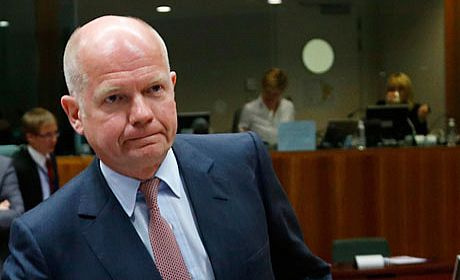Europe Pursues Libyan Model in Syria

How would you assess the recent meeting of EU foreign ministers in Brussels?
Recently, the EU foreign ministers gathered in a meeting to lift the EU arms embargo on the Syrian opposition. In this meeting, the foreign ministers of France and Britain insisted on the abolishment of this law so that the EU countries would be permitted to send arms to the opposition in Syria. There was strong opposition to this proposal including statements made by the Austrian Foreign Minister who severely criticized this plan. Besides Austria, countries like Finland and the Czech Republic were against sending arms to the Syrian opposition and considered it in contradiction with the adopted principles of the EU. They stressed that the principles and foundations of the EU are based on peace and peaceful trends and sending arms to the rebel groups in Syria can be in contradiction with these laws. Therefore, they expressed their opposition to the demand made by France and Britain. Nevertheless, this embargo did not continue and it will be lifted from the coming Saturday and the Syrian opposition will receive arms from that day on. Meanwhile, some countries stated at the end of this meeting that despite lifting the embargo, they will never send any arms to the Syrian opposition; including the Netherlands, Belgium, Sweden, Austria, Finland and the Czech Republic. These six European countries explicitly stated their disagreement with sending arms to Syria which is indicative of division between the effective countries of the EU with regard to the military support of the rebel groups in Syria.
What is the reason behind Britain and France’s insistence on sending arms, particularly when the Geneva-2 conference is to be held soon? Could this issue hurt the upcoming conference?
The issue is that the western countries, including Europe and the US, have reached the conclusion that they are losing on the ground. Considering the advancements of the Syrian army during recent days, especially in al-Qusayr, wherein they were able to recapture these regions and kill many of the opposition forces, the western countries have reached the conclusion that the conditions on the ground are changing to the benefit of the Syrian government. But as William Hague stated in this conference, if Bashar Assad refuses to talk, other options are on the table. This shows that although the Europeans have now reached the conclusion to use other mechanisms and pursue other solutions in order to gain their targeted concessions in Syria, they make efforts to exert necessary pressures on the government of Bashar Assad to participate in talks and receive necessary concessions from the Syrian government at the negotiating table. I believe that this is the precursor to gaining more concessions from the Syrian government and its supporting countries like Russia and Iran in the Geneva-2 conference.
Are the policies of the Europeans in line with US policies? Has there been a division of labor?
I believe that the Europeans do not act separately from US policies. In my opinion, this mission is given to the Europeans by the US to be effective on the ground and exert pressure on the government of Bashar Assad by making such decisions and lifting the arms embargo on Syria. Europe has placed this issue on its agenda so that in case of the possible elimination of the Syrian opposition, these arms would then be sent. Thus, in my opinion, the decision that was made does not necessarily mean that the European countries will send arms in the short run; it will rather be kept as a good excuse so that they could have an open hand if necessary and have legal permission to send arms. Hence, I believe that the Europeans act with complete coordination with the Americans.
If the situation continues with the same trend and the crisis in Syria does not end, is it possible that Europe would intervene in Syria just like what happened in Libya where France intervened in the crisis in Libya along with international forces?
In general, it seems that Europe is taking steps in this path. Of course, if the differences between Syria and Libya are considered, that model could be pursued in Syria as well. It means that, in my opinion, the Europeans pursue the Libyan model in Syria but they will consider the differences in the conditions of these two countries. But they will probably use the Libyan model in the final stage.

